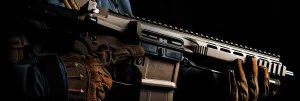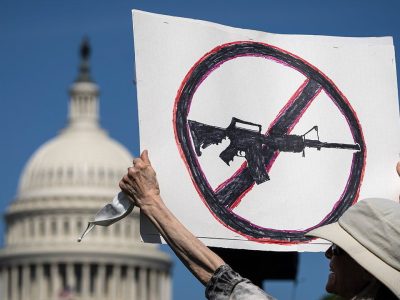Mostly because of the partial government shutdown, the holiday hangover lasted a bit longer this year. But now that it is mid-January, things are coming back to life in Washington. The euphemistically-named “funding lapse” has had a bit of a ripple effect as well. Many other public and private entities took a little longer to get their motors running.

That slowdown was probably a good thing for Marietta gun trust owners. The early 2019 news headlines have not been too good.
Less than a week after they took the gavel, and on the eight-year anniversary of the Rep. Gabrielle Giffords shooting in Arizona, House Democrats introduced a sweeping background check proposal. The universal background check law would apply to pretty much every firearms purchase, including internet and trade show transactions. Many newly-elected House Democrats ran on very strong gun control platforms, and polls show that universal background checks enjoy widespread popular support.
“Today we take a decisive step to help save lives right away,” proclaimed Rep. Mike Thompson (D-CA). “From public polling to the ballot box, the American people have spoken up and demanded action,” the bill’s chief co-sponsor added.
Democrats intentionally shied away from more controversial measures, such as an assault rifle ban or magazine restrictions, in the hopes that the measure would find traction in the Republican-controlled Senate. Nevertheless, there’s no guarantee that Majority Leader Mitch McConnell (R-KY) would allow the body to consider the bill. Even if that happens, expect only a watered-down background check bill to reach the President’s desk.
Here in the Peach State, gun control advocates are active as well. They hope to cash in on the momentum from the federal government’s 2018 bump stock ban. These firearm attachments essentially alter the triggers on semi-automatic weapons. The configuration allows the gun’s recoil to reset the firing mechanism, so the firearm mimics a fully automatic capability. But incoming Governor Brian Kemp ran on a very strong Second Amendment platform, so gun control advocates face an uphill climb.
So, most observers simply expect Democrats to resurrect the failed mental institution reporting requirement bill. Under current law, people who are involuntarily committed to mental institutions may purchase firearms if they have been out for at least five years. In 2018, this bill passed the State House and died in the Senate.
Gun trusts are under scrutiny as well. In Utah, authorities took Utah Gun Exchange co-owner Bryan Melchior into custody after they executed a search warrant at his Sandy residence. The UGE was in the headlines in 2018. This group sponsored nationwide counter-protests in places where gun control advocates used the Parkland school shooting to rally the troops. According to court documents, authorities nabbed “30 firearms, more than a pound of marijuana, numerous THC products and $36,247 in cash” at Mr. Melchior’s home.
Gun trust owners may take some comfort in the fact that Mr. Melchior’s gun trust was not the investigation’s target. Instead, authorities were trying to break up an alleged drug trafficking ring. Presumably, the seized firearms were not part of the trust or were illegal for some other reason.
Gun Control/Gun Trust Background
The 1960s are pretty much a distant memory now. But these turbulent times produced some controversial debates that are still going on today. That’s certainly true with regard to gun violence and gun control.
A few conspiracy theorists would say otherwise, but Kennedy assassin Lee Harvey Oswald apparently used a fake name to buy a sniper’s rifle from a mail order catalogue. In the wake of the popular president’s death in November 1963, a number of very strong gun control measures started working their way through Congress.
For a while, it looked like gun ownership in America in the 1960s might look like gun ownership in Canada in the 2010s. North of the border, it is technically legal to own a gun. But there are so many government restrictions that, according to the Canadian Broadcasting Company, most people do not qualify to own a firearm.
But then, in August 1966, Charles Whitman climbed the stairs at the University of Texas’ observation tower where he killed eleven people and wounded thirty-one others with an assortment of high-powered rifles. At the time, police officers lacked the equipment and training to deal with a situation like that. So, regular Austinites grabbed their hunting rifles and kept Whitman pinned down until a police officer made his way to the tower and up the stairs.
If not for those citizens, there is no telling how many people Whitman might have shot that day. He may have had as many as 700 rounds of ammunition.
The tragic Austin mass shooting took the wind out of the gun control sails. So, in 1968, Congress merely strengthened the 1934 National Firearms Act. At about that same time, the first NFA gun trusts began appearing.
Five Reasons You Need a Gun Trust
In January 2016, the feds changed the rules yet again. This time, the alteration affected gun ownership trusts. The new Rule 41F extends identification and registration requirements to all co-owners in gun trusts. But despite this change, there are still some very good reasons you need a gun trust.
Prevent Accidental Felonies
Normally, only one person can possess or use an NFA firearm. The problem is that, in the real world, multiple people usually want to use these weapons. Depending on the circumstances, Cobb County prosecutors could charge these individuals with a felony for unlawful possession of an NFA firearm. People in these situations may have a very good defense, but that fact won’t keep the state from filing charges.
A gun trust takes care of this problem. The settlor (person who sets up the trust) can designate multiple persons as co-trustees. The paperwork process is streamlined, so it’s also rather easy to delete people later. Moreover, under federal law, there is no limit to the number of co-trustees in a gun trust.
Pass Along Your Values
In the Revolutionary War, private citizens did almost all the fighting until the Continental Congress could organize and field and army. The Minutemen played such a prominent role that the Founding Fathers protected gun ownership in the Constitution. But the Founding Fathers were a lot better at protecting rights than they were in explaining rights. Less than a generation later, in the War of 1812, most militia units were disorganized messes. Many of these people knew they had the right to bear arms, but did not appreciate that right.
Gun trusts, like other kinds of trusts, allow gun owners to pass along their values. Many gun trusts have qualification clauses. Commonly, beneficiaries cannot own part of the corpus (items in the trust) until they reach a certain age or comply with other restrictions that the trust owner has set up.
Ease of Transfer
When individual gun owners pass away, transferring their NFA firearms to their heirs is a complex process. Essentially, current law presumes that the heir is unqualified to own a firearm. Given the rising tide of gun control activity, it may be only a matter of time before that presumption becomes even stronger.
However, the inside trust transfer is much different. Those who are named as beneficiaries in a gun trust need to meet a few legal qualifications. And, as outlined below, the government stays out of the matter, at least for the most part.
Bypass CLEO Signature Requirement
Before the 2016 changes, federal and state laws give local Chief Law Enforcement Officers a great deal of power. Essentially, CLEOs could veto any firearm ownership transfer. They could simply refuse to sign the transfer paperwork. Or, they could have taken the passive-aggressive approach by leaving the form to sit for a few months, hoping that gun owners simply quit trying to have the transfer approved.
Now, with regard to NFA firearms tax stamp applications, the CLEO’s signature is no longer mandatory. Additionally, if the government must approve the transfer, bureaucrats must redact personal information if the filing party asks them to do so.
Preserve Privacy
When assets go through probate, everything is public record. Pretty much anyone can log onto the internet and find out details about the property you own, as well as the value of that property. If your estate includes firearms, these details could be embarrassing at best and unsafe at worst. For many, gun ownership is a very private thing. Furthermore, if people find out about a rare collection of guns on display, you might want to upgrade your home security system, because it will probably be tested.
All kinds of trusts, including gun trusts, keep these transfers private. The probate court never has to know about the assets in a trust, which means your personal representative does not need to list these items on court-ordered inventories. Furthermore, as mentioned, gun trusts avoid government scrutiny. As a rule of thumb, the less the government looks at your firearm ownership, the safer your rights are.
About Your Gun Trust
An attorney should always prepare your NFA trust. Never use the do-it-yourself forms available online. These forms are okay if you just have a small savings account or a used car to place in trust. If you make a mistake, the worst thing that can happen is that the corpus in the invalid trust must pass through probate.
But when it comes to gun trusts, the stakes are quite a bit higher. A mistake probably means substantial jail time, revocation of firearms ownership rights, and a number of other bad things. An experienced attorney will do things right the first time, even if your trust is a complex one.
Additionally, and maybe more importantly, internet forms cannot give you legal advice. If you have a gun trust, you may want to do things like add beneficiaries or change the terms of the trust from time to time. Since NFA trusts are inter vivos (living) trusts, the settlor retains that power. Typically, the settlor is also the trustee (person who manages the trust). So, gun owners have even more power.
Generally, an attorney can set up a gun trust in a quick office visit or even by phone or email. At the first visit, your lawyer will talk to you about your goals, obtain information about the corpus, and answer any questions you may have. Your second office visit is generally just picking up the paperwork.
The inter vivos trust is effective while the settlor is alive, after the settlor passes away, and if the settlor becomes incapacitated for any reason. That last aspect is important, especially if Georgia lawmakers rewrite the mental capacity rules. If the government takes away your gun for any reason, including lack of capacity, it is not easy to get it back.
Gun trusts may contain any type of weapon, but they usually contain NFA firearms, like machine guns and short-barrel shotguns, or attachments such as silencers. These items are difficult to transfer outside of a trust, and also expensive to transfer. The transfer tax is usually $200 per item. A gun trust eliminates these dilemmas.
Gun trusts make an extremely complex situation much easier to handle. For a confidential gun trust consultation with an experienced firearms’ rights attorney in Marietta, contact NFA Lawyers, LLC. After hours appointments are available.



 Gun Trusts in Light of the Latest Federal Court Restrictions on Gun Rights
Gun Trusts in Light of the Latest Federal Court Restrictions on Gun Rights